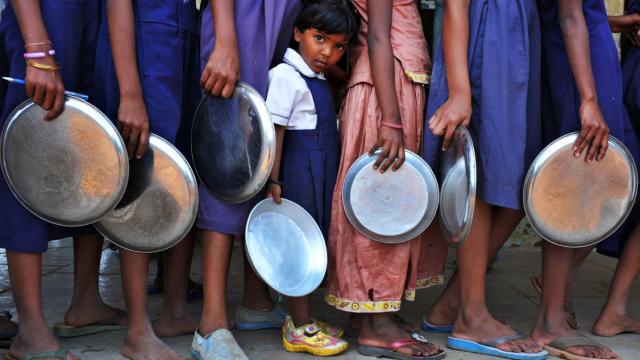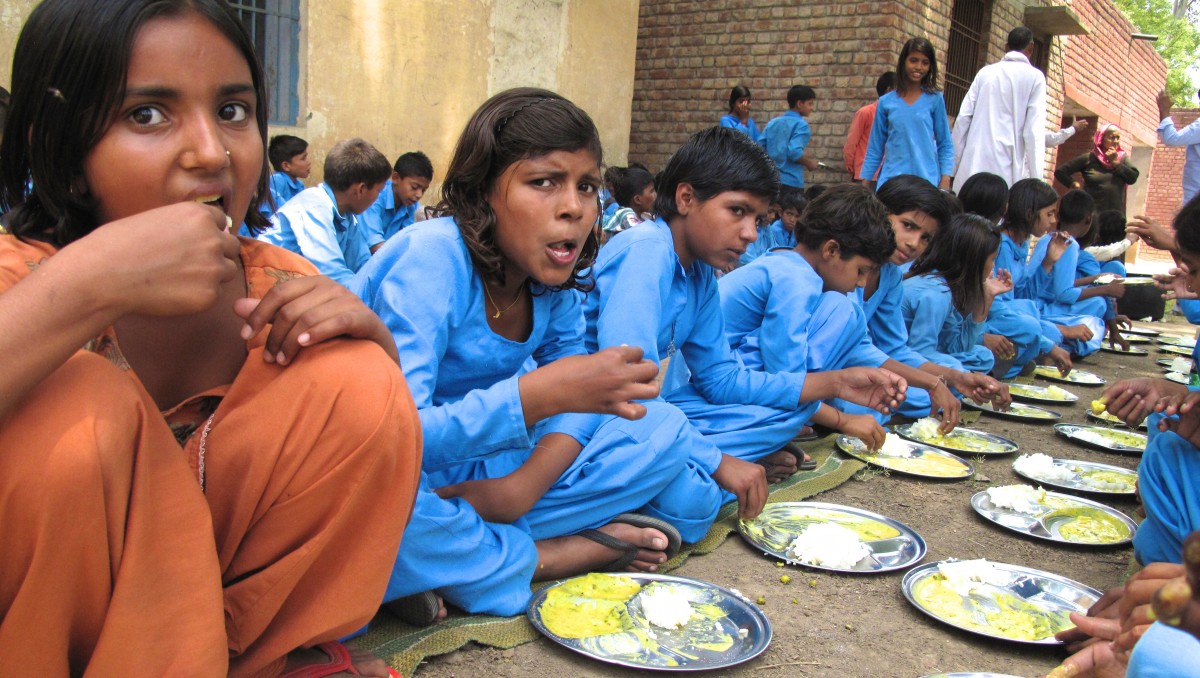
The United Nations Economic and Social Commission for Asia and the Pacific recently had some good news about India’s economy: fiscal growth here in 2014 is expected to see a strong momentum of 5.5%. As The Economist dutifully reported, "the economic outlook is challenging, but there are signs that the worst is over. After slowing to 4.5% in fiscal year 2012/13 (April-March), the GDP growth at factor cost picked up marginally to average 4.7% in 2013/14.” But for many, of course, the so-called “worst” in India is yet to be addressed. And that goes for the millions of children who still lack access to food despite the riches pouring in elsewhere.
“In the rural areas [and] more out of the way places, like remote villages, the story is entirely different,” says Jhnanavi Persad, a social worker who works with tribal children. “The promises the government makes are all during the elections and for votes only. Once those votes are cast, no one looks back at these poor deprived populations who are still waiting for things as basic as clean water and schools.”
Persad says she finds the lack of midday meals in the schools the most galling. “Some of these children come just because this is the one solid meal of their day,” she says. “But the schools are often not given the grains to cook or they lack the people to make the meals, or else the food preparation facilities are so bad that the meals are a danger the children are exposed to, instead of being nutritious.”
Fatal School Meals
It’s been more than 15 months since the ghastly Bihar school poisoning in which 22 children died from consuming food contaminated with traces of phosphorous. But little has changed, especially in the schools far away from the country’s glittering cities and avoided by the media glare.
“We are truly forgotten,” says a teacher in the village of Karulihai, near Rewa in Madhya Pradesh state. Her school is a two-room building distant from the highway that connects the village with the outer world. When I visit, hearing the car engine the teacher rushes out thinking it’s the van bringing rice she intends to cook for the children who study here. Serving as the teacher, cook and cleaner in this school, the woman says she hasn’t made a single meal for students in the last year. “I keep complaining to the officials here,” she says, "but nothing happens.”
India’s recently elected Prime Minister, Narendra Modi, has raised many slogans aimed at defeating poverty in the country. His address to the nation on Aug. 15, celebrating the country’s 68 years of independence, declared a “war on poverty.” And on Aug. 28, U.S. Congressman Aaron Schock (R-IL) led a humanitarian visit ostensibly to support international anti-poverty partnerships and global economic development between India and the U.S.
But despite the lofty promises and campaigns from India's power holders, and the economic largesse flowing to certain sectors, basic humanitarian problems aren't going away.
“It’s not just about the poor,” says Dr. Kailash Nath, a professor of economics. “It’s about these issues, the nuts and bolts, of eradicating hunger and ensuring a healthier population that is the problem. It’s easy to make sweeping generalizations about how much money has to be donated, [but] it’s more important to understand where the funds must be allocated and why."
"Issues like school feeding programs aren’t just about food, but about reach," Nath adds, "Can the government ensure that food grains reach these remote, out-of-the-way schools on time?”
Far and Forgotten
For many, the answer to Dr. Nath’s question, sadly, has become clear: if you're too far from the urban centers of activity – the most obvious center being the capital, Delhi – then you tend to be forgotten. The village of Gadhwai, also in Madhya Pradesh state, is a remote hamlet. The population here is mostly tribal and poor, eking out a basic living from land which few families own.
For the last three years the small, one-room school here hasn’t seen a single midday meal served to its impoverished students. Like everywhere else in India, corruption here is rife. One school teacher in a nearby district sold all the rice allotted for the meals and decamped with the cash.
But as Nath points out, it’s not always about the food. Sometimes the people who cook the meals – arguably the most important people in the whole chain – aren't paid. In September, women cooking children's school meals in the Dabhaura village of Rewa, in Madhya Pradesh, reported that they hadn’t been paid their $20 monthly salary in two months. Complaints to the officials in charge have gone unheeded. And last month, the Times of India reported that the government rejected raising school cooks' salaries.
If the tragedy in Bihar serves as any reminder, the people who handle the food at India's schools remain of primary importance ensuring the safe consumption by children who depend on those meals to survive.
Yet, “this is an issue where little activism happens,” adds the social worker Jhnanavi Persad. “It’s a problem that affects the poorest of the poor. The only time it gets some attention is when something as awful as the Bihar school poisoning happens.”
Meanwhile, India’s most vulnerable population continues to eat at risk, or not to eat at all – and all they can do is cry in the wilderness.
Follow the author, Paromita Pain, on the Commons or on Twitter @ParoP.
3 WAYS TO SHOW YOUR SUPPORT
- Log in to post comments












